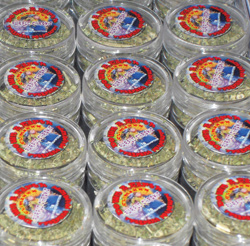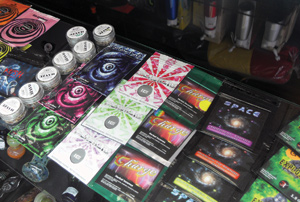Puff the Synthetic Magic Dragon
Melissa Waller
The Signal
Incense and potpourri are most commonly known for their delightful fragrance around the home; however, these once-innocent items are now being used as a front for selling synthetic marijuana products.
Marketed as Spice, K2, Kush, Yucatan Fire and King Kong, to name a few, these products can be found at gas stations, convenience stores and smoke shops. Some stores even make and sell their own recipe.
These packages of loose-leaf herbs are distinctly different than the long incense sticks people purchase and burn for its scent. People are smoking these leaves to experience marijuana-like highs.
The controversy: It’s legal.
Shane Arredondo, Chambers County deputy sheriff, said these incense products display warnings against using them for human consumption; therefore, they are not regulated by the Food and Drug Administration and can be sold legally.
While selling these synthetics as nonconsumable incense is legal in most areas, some cities and counties have banned certain products. Baytown has added an amendment to the city’s controlled substance ordinance and as of Oct. 25, the loose-leaf products labeled as incense can no longer be legally sold.
Baytown Smoke Mart store owner Issa Baba no longer sells incense due to Baytown’s ban. He makes and sells potpourri instead.
“Due to the restrictions in Baytown, we have to get our customers used to new products,” Baba said. “The strongest one we have is our own brand. It’s also the most expensive.”
Baba’s location on Garth Road is the most popular of his four locations, and products in his shop range from $10 to $30. Baba said that the clientele who purchase these synthetic products at this location range in age from 20 to 65 and normally 60 percent male. Baba’s customers reportedly use these products for relaxation and pain relief as well as gaining marijuana-like highs.
Robert Smith, a Smoke Mart customer, disagrees with the ban in Baytown.
“Some people need something to help them relax and slow down for a few minutes,” Smith said. “I have used different incense products to do just that. Not everyone uses these products to get high.”
Proponents of synthetics argue that these legal alternatives to marijuana are no more harmful than alcohol, which is legal.
“I know people who drink every day and are much more dangerous than people who use incense,” Smith said. “People drink and drive every day, but it is still legal to buy alcohol. Any product can be deemed dangerous if it is abused.”
American Association of Poison Control Centers spokeswoman Jessica Wehrman said that the use of synthetic marijuana products is a growing phenomenon. In 2009, U.S. poison centers took 14 calls regarding these products. As of Nov. 15, 2010, poison control centers have taken 2,193 calls in 49 states and the District of Columbia.
Pam, whose last name was withheld, is a nurse and specialist in poison information at Southeast Texas Poison Center. Pam said that she has definitely received more calls this year regarding incense-related illnesses.
“Symptoms vary by person because of the many types,” Pam said. “Dizziness, nausea and vomiting are the most common symptoms reported to poison control. Other side effects are similar to marijuana use.”
A current UHCL student, who has smoked incense to get high and wished to remain anonymous, agreed and compared the effects to marijuana.
“I have smoked for about a year and a half – like real marijuana,” the student said. “I grew up a bit and stopped that. When this product came out I decided to give it a try just because I liked the feeling and didn’t want to break the law. It’s about the same as high-grade marijuana or hydro.”
Law enforcement agencies across Texas are monitoring this situation and finding it even more difficult to determine if a person is high from marijuana substitutes because legal synthetics do not contain tetrahydrocannabinol, or THC, the main psychoactive substance in marijuana.
Arredondo said that during a traffic stop, officers are not able to determine if an individual is under the influence of marijuana or a synthetic.
“The legalities are the same whether someone is high from marijuana or incense,” Arredondo said. “If someone is suspected of driving while high, an officer will conduct a field sobriety test. If the individual does poorly, an officer will request a blood test. Since THC does not appear in blood work, an officer will then rely on the patrol car’s video of the field sobriety test for burden of proof in a court of law.”
The anonymous UHCL student said he sees no harm in trying the synthetics.
“What do you have to lose? It’s not illegal and the effects are temporary,” the student said.
Arredondo advises people to refrain from using these products because they impair judgment the same as marijuana and DWI charges are the same.
The FDA has not been able to test these incense and potpourri products for long-term effects because they are not intended to be used by humans. Pam urges people to refrain from using them because they are relatively new and the effects are unknown.




Comments are closed, but trackbacks and pingbacks are open.